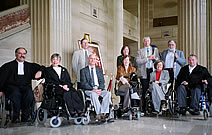Act Now

Empower U: Learn to Access Your Disability Rights Training on Canadian Human Rights, the Convention on the Rights of Persons with Disabilities (CRPD) and its Optional Protocol (OP) training aims to increase awareness of how to address discrimination using more familiar Canadian human rights laws such as Human Rights Codes and the newer international Convention on the Rights of Persons with Disabilities (CRPD). This is training for persons with disabilities by persons with disabilities. The training is part of a project funded by Employment and Social Development Canada and implemented by the Council of Canadians with Disabilities (CCD) in collaboration with Canadian Multicultural Disability Centre Inc. (CMDCI), Citizens With Disabilities – Ontario (CWDO), Manitoba League of Persons with Disabilities (MLPD) and National Educational Association of Disabled Students (NEADS). Read more.
Sign Up for our monthly digest
A monthly newsletter from CCD about what is happening in the community
A Long History of CTA Inaction in the Establishment of Accessibility Regulations
Related Documents
October 12, 2023
Travelling to the North to Gather Information towards Developing CTA Accessibility Regulations for Small Carriers and Terminals Not Covered by the Accessible Transportation for People with Disabilities Regulation (ATPDR)
March 15, 2018
Bill C-49 Empowers Goliath and Takes Away David's Sling Shot
March 14, 2018
Transportation Modernization Act (Bill C-49)
February 14, 2017
Via E-mail: president-chair@otc-cta.gc.ca
Mr. Scott Streiner
Chair and CEO
Canadian Transportation Agency
15 Eddy Street
Gatineau, Quebec J8X 4B3
Dear Mr. Streiner:
Subject: Request for a meeting
As you are aware, there has been a long history of CTA inaction in the establishment of accessibility regulations. The government's announcement of a Canadians with Disabilities Act represents an opportunity to sweep aside years of inaction and move forward, just as the Americans with Disabilities Act signaled the opportunity for systemic action and quantum leaps forward for persons with disabilities south of the border. The Council of Canadians with Disabilities (CCD), a national organization of people with various disabilities working for an accessible and inclusive Canada, has been monitoring Canada's progress on accessible transportation since the 1970s.
It is CCD's position that we will go with whatever structure works to deliver enforceable accessibility regulations and actively enforces the undue obstacle jurisdiction as well as addresses new barriers in a preventive fashion. It remains very much an open question whether the Canadian Transportation Agency (CTA) is the body that is capable of delivering an accessible transportation network in Canada. To date, there has been neither meaningful progress nor commitments people with disabilities people can rely upon.
We are very concerned about the breaking up of the specialized Accessible Transportation Directorate unit and find it ominous. We need more expertise, not less. The Directorate was not the reason the Agency did not develop new and update old regulations. In the past, they developed draft regulations, and later guidelines, which were circulated for comment. This process is comparable to that followed in the United States when developing regulations under the Air carrier, Urban Mass Transportation and Americans with Disabilities Acts. Downsizing and diluting this expertise signals movement in the wrong direction. CCD finds the agency slow to issue regulations, even after it adjourned cases and announced a major review.
We are also concerned about the lack of progress on systemic cases in general, which supports the conclusion that the current structure isn’t working well. Presently, mediated cases have nondisclosure agreements forced upon the participants. The effect is that no information about past agreements being provided to the public. We would like cases posted on the web with names and identifying information possibly being redacted. The present process does not afford an opportunity for complainants to research what has been agreed to in the past.
At the last advisory committee meeting, VIA Rail asked for input concerning the accessibility of proposed new trains. Since CCD had to go to the Supreme Court to ensure the trains bought from Britain would be accessible, we feel it is necessary to be able to review the accessibility plans for any proposed new trains. This is particularly necessary because the Agency's Guidelines are decades old and out of date. This should be done before rather than after the fact of any possible purchase agreement. Again, VIA Rail had asked for our input but seems unwilling to share its plans. We would like this information provided, including all reports.
I am writing to request a meeting to discuss these and related matters at your earliest convenience.
Sincerely,
Bob Brown
Chairperson
CCD Transportation Committee
cc: Carla Qualtrough
Minister of Sport and Persons with Disabilities
E-mail: Carla.Qualtrough@parl.gc.ca
James van Raalte
Director General, Office for Disability Issues
E-mail: james.vanraalte@hrsdc-rhdcc.gc.ca

CCD wins VIA Rail case at the Supreme Court of Canada on March 23, 2007.
